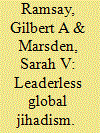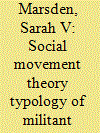|
|
|
Sort Order |
|
|
|
Items / Page
|
|
|
|
|
|
|
| Srl | Item |
| 1 |
ID:
142642


|
|
|
|
|
| Summary/Abstract |
Jihadist violence is typically associated with being particularly indiscriminate. Often, as in variations of the ‘new terrorism’ thesis, this characteristic is proposed to correspond in some way to its other attributes such as its globalised, decentralised and ‘postmodern’ religious nature. Recent work appears to give more substance to such claims, by claiming to show a relationship between indiscriminate violence and decentralised group organisation. However, in this paper we show, based on an analysis of jihadist targeting in Western Europe and America from 2001 to 2013, that targeting choices by jihadists unconnected to organised militant groups have in fact been consistently more, rather than less discriminate in their targeting choices than their better-integrated peers. Drawing on this finding, as well as a broader reading of jihadist targeting discourses, we argue for a more complex understanding of the relationship between radicalisation, extremist ideology, decentralisation, and targeting choice.
|
|
|
|
|
|
|
|
|
|
|
|
|
|
|
|
| 2 |
ID:
148926


|
|
|
|
|
| Summary/Abstract |
Typologies are ubiquitous in terrorism studies, illustrating their continued appeal as a tool to further our understanding of this form of political violence. Despite this, to date, the promise of an empirically derived typology has largely been neglected. In addressing this gap, this article sets out a typology developed from Social Movement Theory. Using a novel statistical technique to derive a three-dimensional framework for categorising militant groups, the typology incorporates both organisational characteristics and the wider political context. The result is a typology defined by three conceptual constructs: political capacity, war-making capacity, and network capacity. Alongside these organisational features, imposing measures of the wider political opportunity structure reveals eight types of militant organisation. To explore the utility of the framework, a preliminary analysis interprets the typology in light of the presence of wider conflict. That a robust relationship is found between the various types and whether groups were operating in peacetime, civil war, or low-intensity conflict, goes some way to demonstrating its utility as an analytical tool. Conclusions draw attention to the importance of contextualising militant groups in their socio-political setting, and the benefits of combining theory alongside empirical analysis to develop robust characterisations of violent organisations.
|
|
|
|
|
|
|
|
|
|
|
|
|
|
|
|
|
|
|
|
|